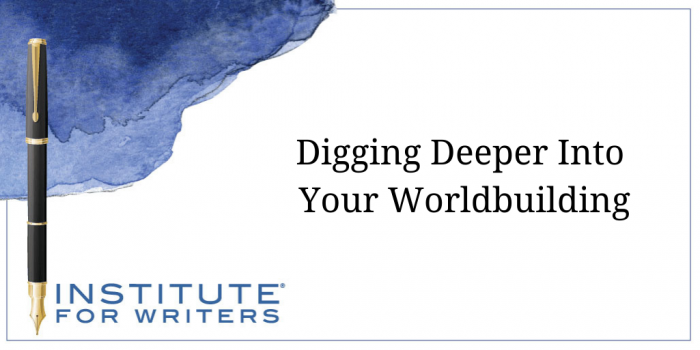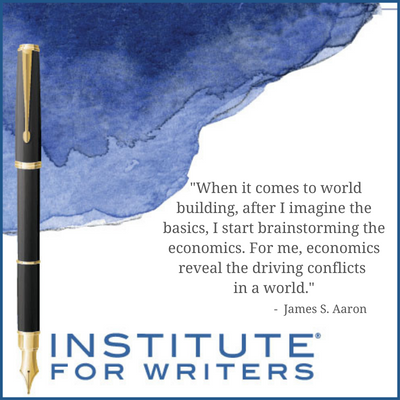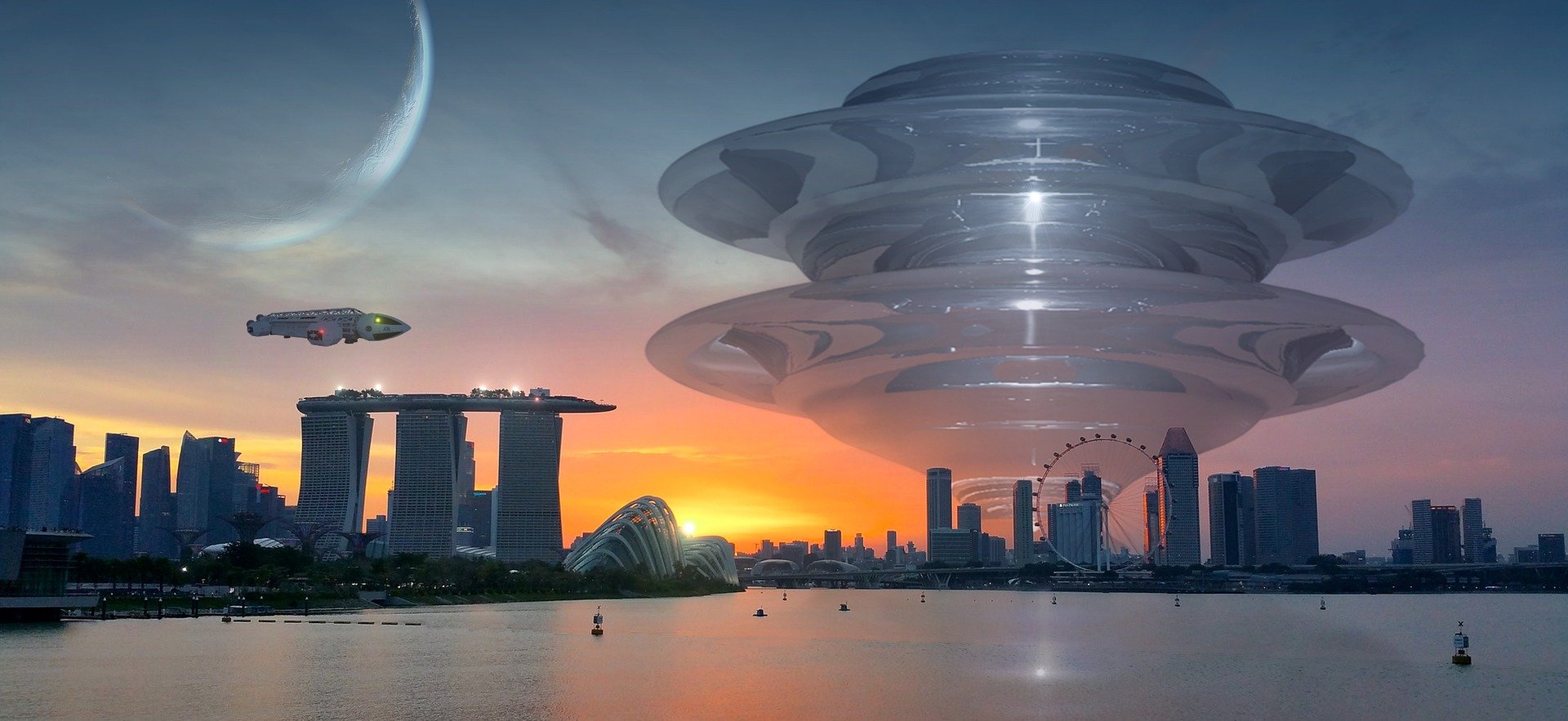1000 N. West Street #1200, Wilmington, DE 19801
© 2024 Direct Learning Systems, Inc. All rights reserved.

We teach our students how to write and get published!
View our Course Catalog >
Want to elevate your story worldbuilding? Start by asking the right questions. In this article, I share insights on what professional speculative fiction authors ask themselves as they create their stories.
This is the second article in this Institute for Writers series on Worldbuilding. Be sure to read the Worldbuilding Checklist.
In today’s post, “Digging Deeper into your Worldbuilding,” you’ll take the foundational information from the first article and broaden it out in specific areas that are important for your particular story.
In the first article, I listed common elements of worldbuilding. While every author should spend at least some time considering every element of the world, it’s important to dive deep into the ones that strike a chord with you and with your story.
 One of the worldbuilding elements listed is “economics.” James S. Aaron is the bestselling author of fifteen novels (and counting), and many short stories, with a primary focus on science fiction.
One of the worldbuilding elements listed is “economics.” James S. Aaron is the bestselling author of fifteen novels (and counting), and many short stories, with a primary focus on science fiction.
Today he shares some of the “behind the scenes” of his process. While it takes him some time to go down each rabbit hole of his self-questioning, you can quickly see how this process can be a treasure trove of content for a reader to explore.
“When it comes to world building, after I imagine the basics, I start brainstorming the economics. For me, economics reveal the driving conflicts in a world.” He asks:
• What is valuable? Who is valuable?
• What do the people use for currency?
• What’s the black market currency?
• What are resources and why are they scarce?
• How do resources move around the world?
• Who owns the resources, and how does the government benefit from or try to control those resources?
He continues, “Starting with the economics of the world leads me down hundreds of great rabbit holes where I can answer questions like:
• What are their clothes made of?
• Who makes them?
• Where do those materials come from?
• What means of transportation do they have?
• How do they repair those transportation devices?
• What do they use as fuel?
• Who has hard power in this society?
• Who exercises soft power over them?
For me, the economics question is the seed that opens up all the other parts of a world, whether you’re conceiving a colony planet or a low fantasy realm. Economics reaches into relationships, family, government, class, leisure, war… The rabbit holes keep opening up. Have fun!”
An author can delve into whatever fantasy worldbuilding element that works best for their story. Above, James focuses on economics. But Brandon Sanderson is famous for asking questions like “How accessible is water?” Water is a critical resource for most living things, so having too much or too little of basic resources creates wonderful story fodder.
What elements are important to you and your story?
When you’re meditating on your story and asking yourself questions as James did in the section above, you will run into moral questions. For example, James asked questions about the black market, and who is valuable. You can immediately see how this can become a morally complex topic.
This idea of exploring the moral questions comes from different sources, but I love the discussion between the authors at Writing Excuses, season fourteen.
Two questions to keep asking about the different elements you’re interested in are:
• what if?
• why not?
Building on James’s comments above:
“What are their clothes made of? Who makes them? Where do those materials come from?”
 Though James writes in science fiction, let’s shift this to fantasy. What if the creatures are pixies and their clothing is made from leaves and flowers. The clothing can only be “harvested” during the spring, summer, and early fall before things get too brittle. But what if they need clothing repairs in the winter? Why not only give flower-power to certain pixies? What if some have power over the wind and need help from a “flower pixie” in the winter or they’ll freeze?
Though James writes in science fiction, let’s shift this to fantasy. What if the creatures are pixies and their clothing is made from leaves and flowers. The clothing can only be “harvested” during the spring, summer, and early fall before things get too brittle. But what if they need clothing repairs in the winter? Why not only give flower-power to certain pixies? What if some have power over the wind and need help from a “flower pixie” in the winter or they’ll freeze?
What if the “wind pixies” get tired of relying on the “flower pixies” and they create a binding oath with another character? Why not genre twist and have Father Time and Mother Earth as characters. And the “wind pixies” make an oath with Mother Earth, and have the weather rotate each season every week? Why not…?
It’s always good to toss out your first ideas and keep asking these questions to force your brain to be creative. So, what if Father Time wants to go on vacation, but can’t because Mother Earth uses the pixies to change the weather. And Father Time moves rather slowly and every time he packs for summer, it’s suddenly fall. And what if he repacks, but then it’s ski weather? Okay, so this idea is rather silly, which many readers prefer, but if you want something darker, you can easily go down that road as well.
As you’re worldbuilding and running through the exercises above, you will find more compelling questions. These are the types of things that your characters can explore and learn. If it’s interesting for you, it might be something interesting for the character and reader. As far as doing this before or after you start writing, that’s up to you. But for outliners, make notes of your thought process and of what you found interesting. You will likely want to integrate these steps into your plot arc.
Furthermore, writers don’t necessarily need to explain how everything works because the character may not even know. As a bonus, this helps avoid info dumps. If you let your characters explore big, interesting questions, they can pull the reader through an entire story. On the other hand, if the plot doesn’t hang on these world elements, they can be a portion of the story, like perhaps impacting a pinch point.
Worldbuilding will always have holes, but the more you explore your world, meditate, sleep on it, and have characters engage in it, the fewer gaps you’ll have. You might even realize after you’re further into a series that you have a hole in your worldbuilding. It’s not against the rules to make a rule or reason for the “hole” later! Or you can just roll with it, too. Like I said, no world is perfect.
All of the elements and techniques shared in these first two articles can help you create a robust world that will feel “real” to your reader. They want to fall into your story, but they must trust you, first. To earn the trust of the reader, you’ll have to show them that you’ve done your homework.
Now that we’ve reviewed the basics in the first article, and shared questions authors ask themselves to make their worldbuilding as interesting as possible, let’s go through the “most common mistakes” in the next article in this series! Avoid these blunders early on and your story creation and editing will go much smoother.
Want a guide to help you build your world? Let one of our one-on-one mentors help you make your world and characters as real as can be. Take the assessment here!
Article #1: Worldbuilding Checklist
Article #2: Digging Deeper into your Worldbuilding (this article)
Article #3: 9 Worldbuilding Mistakes to Avoid
Article #4: Worldbuilding Bible
Kristin J. Dawson is a non-recovering chocolate and romantic English movie addict who loves to read science fiction and fantasy. You can find her most often indulging her favorite things at 2 am — night owls unite! Kristin writes high fantasy with political intrigue, a bit of romance, and of course, magic. She’s was a 2019 UTOPiAcon Debut Book Award Nominee and Swooney Award Nominee. When she’s not writing, taking her kids on mountain adventures, or cleaning out the chicken coop, she’s probably trying to talk her author friends into more shenanigans.
Chat with Kristin on Instagram (@KristinImagines), on Facebook (@KristinJLiterary), or her website at kristinjdawson.com.
1000 N. West Street #1200, Wilmington, DE 19801
© 2024 Direct Learning Systems, Inc. All rights reserved.
1000 N. West Street #1200, Wilmington, DE 19801
© 2024 Direct Learning Systems, Inc. All rights reserved.
1000 N. West Street #1200, Wilmington, DE 19801
© 2024 Direct Learning Systems, Inc. All rights reserved.
1000 N. West Street #1200, Wilmington, DE 19801
© 2024 Direct Learning Systems, Inc. All rights reserved.

1000 N. West Street #1200, Wilmington, DE 19801
© 2025 Direct Learning Systems, Inc. All rights reserved.

1000 N. West Street #1200, Wilmington, DE 19801
©2025 Direct Learning Systems, Inc. All rights reserved. Privacy Policy.
3 Comments